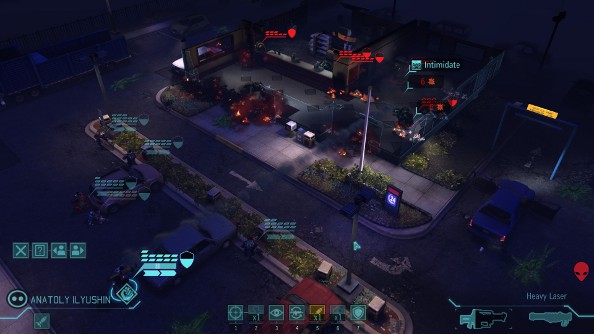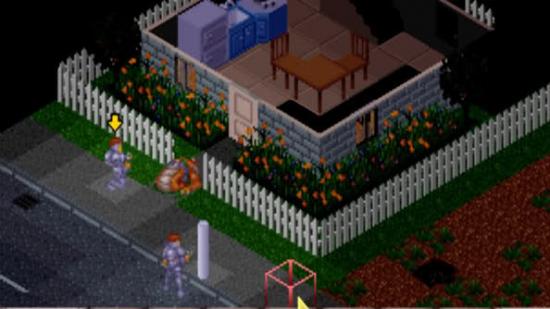One of the more interesting talks I saw at GDC was X-COM creator Julian Gollop’s postmortem of his strategy masterpiece, twenty years after the fact. Far from sounding a triumphant note, Gollop described a nightmarish development cycle that differed only in scale from modern AAA projects, and then a series of disastrous attempts by himself and different publishers to recapture the magic of the original X-COM. Toward the end, he credited Firaxis with “saving the day” for the troubled franchise and setting Gollop free from his own struggling efforts to recreate the the 1994 classic.
It’s easy to see X-COM only in terms of the outsize reputation it acquired, but Gollop described a development cycle that was beset by mistakes, mismanagement, and a confused publishing situation. Gollop frankly admitted that project management at Microprose and especially Mythos Games was laid-back to a fault, which caused X-COM to take 30 months to develop instead of the original 18 promised to publisher Microprose, and three months of intensive crunching.
While their core innovations were all there in the final game, including destructible terrain, a 3D map, fog of war, an advanced lighting system, and the Geoscape, Gollop admitted that he thinks they did a bad job on a lot of it. He felt their interface was awful, the game balance and pacing was poor, and he hated the anticlimactic “bug hunts” that most successful missions devolved into.
Yet the game works, despite all that, because what actually drove it was the “reward cycle from geoscape to tactical mission back to geoscape,” Gollop said. It was a relationship characterized by AI features that created a powerful illusion of intelligence, and procedural mission generation that made the game feel tense and fresh every time.
Death by success
But Gollop talked about how the game’s success kind of caught everyone by surprise, including new publisher Spectrum Holobyte, who had briefly cancelled development on the original game. Now Spectrum Holobyte couldn’t get enough X-COM, and wanted a new one within six months. Gollop and Mythos let Microprose churn out Terror from the Deep while they set about making the X-COM of their dreams.
Gollop pointed out that for all the acclaim and status X-COM enjoyed, neither he nor any of the publishers who owned the franchise ever fully appreciated what the original game accomplished, or what truly made it special. Microprose flailed wildly with the brand, mismanaging it into the ground as they attached the X-COM name to a shooter and a space sim.
Gollop’s own X-COM: Apocalypse, which came out in 1994, was supposed to be the true heir to X-COM, but fell victim to another bad development process (it went through six producers before it shipped) and Gollop’s own misjudgments. ““From my point of view I made a lot of mistakes with that because, as with Microprose, I didn’t truly appreciate the value of what I created with the first game. So we didn’t handle the development of the franchise very well.”

What I found so fascinating about Gollop’s confession that he underappreciated his masterpiece is they way it illustrates how often great game design is not just about vision, but the obstacles and compromises that change it. Gollop, then and now, looks at X-COM and sees a mishandled development, a lousy interface, a limited AI, and bad pacing and pacing. Yet most of those flaws are also hard to tease apart from the replayability and brutal challenge that made X-COM such a special experience for its fans. Gollop spent years trying to top X-COM, but it sounds as if his biggest problem was that he was trying to improve a great game that he wasn’t actually happy with.
This is also why it is so hard to recapture what makes a classic great, because what are you supposed to do with the problematic parts? There is a tension between making a “better” X-COM and simply making a different one, and neither Gollop, nor Microprose, nor 2K ever figured out how to resolve it.
Which is perhaps why Gollop sounded so relieved when he turned the talk towards Firaxis’ XCOM. “Take2 had the same schizophrenic approach to the franchise that Microprose had. But Firaxis saved the day,” he said. “They did a tremendous job creating something which was familiar but at the same time fresh. It is amazing that after 20 years a brand that had gone so badly awry was finally put right.”
He loved the “board game sensibilities” of the Firaxis remake, especially the way they replaced Time Units with a simple movement / action system with some additional rules and abilities to add flexibility.
Toward the end of his talk, he paid Firaxis and XCOM perhaps the highest compliment they will receive, from one X-COM creator to another: “From my own point of view, I no longer feel the urge to remake X-COM. I think Firaxis have done the job.”
